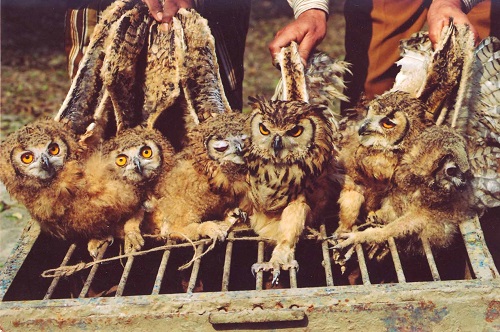TRAFFIC photo
By
Jose Kalathil
Birds are poached for their bones, talons, skulls, feathers, meat and blood, which are then used in talismans, black magic, and traditional medicine
New Delhi: The almost one-month-long Indian festival of lights, Diwali, ends today. The period also witnessed thousands of owls being illegally trapped and sacrificed for use of tantric rituals and ceremonies. While the exact number of owls traded domestically is unknown, TRAFFIC, the wildlife trade monitoring network, estimates the figure in the thousands. According to the agency, the custom is a threat to the future of the species in India.
TRAFFIC’s investigations into illegal owl trade in India, published in the report “Imperilled Custodians of the Night,” says, owls are used and traded for a wide variety of purposes including for black magic, street performances, taxidermy, private aviaries/zoos, food, used in folk medicines, capturing other birds, the use of claws and feathers in making headgear, and eggs used in gambling.
Illegal trapping and trade peaks around the Diwali festival month, especially in Northern India. Occult practitioners drive consumer demand by touting the use of owl parts for purposes ranging from curing various illnesses to fighting the effects of evil spirits. Birds are poached for their bones, talons, skulls, feathers, meat and blood, which are then used in talismans, black magic, and traditional medicine. Owls, especially with “ears” (or tufts) are thought to possess greatest magical powers, and Diwali is claimed to be the most auspicious time for making owl sacrifices.
Of the 30 species of owls found in India, 15 have been found in illegal wildlife trade with Spotted Owlet Athene brama, Barn Owl Tyto alba and Rock Eagle-Owl Bubo bengalensis found to be the most commonly recorded species in trade.
Dr Saket Badola, Head of TRAFFIC India said, “TRAFFIC’s advisory is a strong reminder of rampant trade and sacrifice of owls in India. We urge enforcement agencies to strengthen wildlife law enforcement efforts around owl habitats, forest areas, and bird trade markets.”
“As the practice of owl sacrificing begins with the start of the Dussehra festival, moving onto Diwali, poachers involved within the bird trade are most active during this season. This is one of the most important times for enforcement agencies to remain alert and increase their vigilance,” Dr Badola added.
Owls are protected under the Wildlife (Protection) Act of India that prohibits hunting, trade or any other form of utilisation of the species or their body parts. Their international trade is further restricted under the Convention on International Trade in Endangered Species of Wild Fauna and Flora (CITES).
Owls play a vital role in local ecosystems, not least by benefitting farmers by preying on small rodents and other crop pests, making their ongoing protection of high ecological, economic, and social importance.
TRAFFIC, the leading non-governmental organisation is working globally on trade in wild animals and plants in the context of both biodiversity conservation and sustainable development. TRAFFIC works closely with its founding organisations, IUCN and WWF.
Jose Kalathil
Jose Kalathil is a senior journalist based in New Delhi. With more than three decades of experience in India and abroad, he is comfortable writing on any subject under the sun. He may be contacted at [email protected]



No Comments Yet!
You can be first to comment this post!